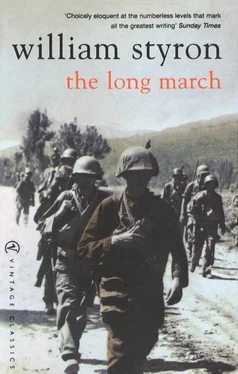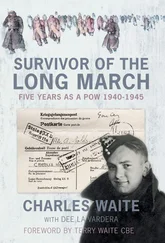William Styron - The Long March
Здесь есть возможность читать онлайн «William Styron - The Long March» весь текст электронной книги совершенно бесплатно (целиком полную версию без сокращений). В некоторых случаях можно слушать аудио, скачать через торрент в формате fb2 и присутствует краткое содержание. Город: New York, Год выпуска: 1952, ISBN: 1952, Издательство: Vintage Classics, Жанр: prose_military, на английском языке. Описание произведения, (предисловие) а так же отзывы посетителей доступны на портале библиотеки ЛибКат.
- Название:The Long March
- Автор:
- Издательство:Vintage Classics
- Жанр:
- Год:1952
- Город:New York
- ISBN:978-0099422792
- Рейтинг книги:3 / 5. Голосов: 1
-
Избранное:Добавить в избранное
- Отзывы:
-
Ваша оценка:
- 60
- 1
- 2
- 3
- 4
- 5
The Long March: краткое содержание, описание и аннотация
Предлагаем к чтению аннотацию, описание, краткое содержание или предисловие (зависит от того, что написал сам автор книги «The Long March»). Если вы не нашли необходимую информацию о книге — напишите в комментариях, мы постараемся отыскать её.
The Long March — читать онлайн бесплатно полную книгу (весь текст) целиком
Ниже представлен текст книги, разбитый по страницам. Система сохранения места последней прочитанной страницы, позволяет с удобством читать онлайн бесплатно книгу «The Long March», без необходимости каждый раз заново искать на чём Вы остановились. Поставьте закладку, и сможете в любой момент перейти на страницу, на которой закончили чтение.
Интервал:
Закладка:
He came alive like a somnambulist abruptly shocked out of sleep, and he lunged forward onto the road with a wild and tormented bellow. “Hey, you people, get off that goddam truck!” He sprang into the dust with a skip and a jump, toiling down the road with hobbled leg and furious flailing arms. By his deep swinging gait, his terrible limp, he looked no more capable of locomotion than a wheel-chair invalid, and it would have been funny had it not seemed at the same time so full of threat and disaster. He pressed on. “Off that truck, goddammit, I say! Off that truck. Saddle up. Saddle up now, I say! On your feet!” he yelled. “Get off that goddam truck before I start kicking you people in the ass!” His words flayed and cowed them; a long concerted groan arose in the air, seemed to take possession of the very dawn; yet they debarked from the truck in terrified flight, scuttling down like mice from a sinking raft. “Move the hell out of here!” he shouted at the truck driver, a skinny corporal, eyes bulging, who popped back into the cab in fright. “Get that heap out of here!” The truck leaped off with a roar, enveloping the scene in blue smoke and a tornado of dust. Mannix, with windmilling arms, stood propped on his toe in the center of the road, urged the men wildly on. “Saddle up now! Let somebody else crap out O.K., but not you people, hear me! Do you hear me! Goddammit, I mean it! Shea, get those people moving out up there! You people better face it, you got eighteen more miles to go…” Culver tried to stop him, but they had already begun to run.
Panic-stricken, limping with blisters and with exhaustion, and in mutinous despair, the men fled westward, whipped on by Man-nix’s cries. They pressed into the humid, sweltering light of the new day. Culver followed; O’Leary, without a murmur, puffed along beside him, while to the rear, with steady slogging footsteps, trailed the remnants of the battalion. Dust billowed up and preceded them, like Egypt’s pillar of cloud, filling the air with its dry oppressive menace. It coated their lips and moist brows with white powdery grit, like a spray of plaster, and gave to the surrounding trees, the underbrush and vacant fields, a blighted pallor, as if touched by unseasonable frost. The sun rose higher, burning down at their backs so that each felt he bore on his shoulders not the burden of a pack but, almost worse, a portable oven growing hotter and hotter as the sun came up from behind the sheltering pines. They walked automatically, no longer with that light and tentative step in order to ease the pain in their feet, but with the firm, dogged tread of robots; and if they were all like Culver they had long since parted with a sensation of motion below the hips, and felt there only a constant throbbing pain—of blisters and battered muscles and the protest of exhausted bones.
Then one time Culver saw the Colonel go by in a jeep, boiling along in a cloud of dust toward the head of the column. He caught a glimpse of him as he passed: he looked sweaty and tired, far from rested, and Culver wondered how justified Mannix’s outrage had been, assigning to the Colonel that act of cowardice. So he hadn’t been pacing the march, but God knows he must have been hiking along to the rear; and his doubts were bolstered by O’Leary’s voice, coming painfully beside him: “Old Captain Mannix’s mighty pissed off at the Colonel.” He paused, wheezing steadily. “Don’t know if he’s got a right to be that way. Old Colonel ain’t gonna crap out without a reason. Colonel’s kind of rough sometimes but he’ll go with the troops.” Culver said nothing. They plodded ahead silently. Culver felt like cursing the Sergeant.
How could he be so stupid? How could he, in the midst of this pain, yield up still only words of accord and respect and even admiration for the creator of such a wild and lunatic punishment? Only a man so firmly cemented to the system that all doubts were beyond countenance could say what O’Leary did—and yet—and yet God knows, Culver thought wearily, he could be right and himself and Mannix, and the rest of them, inescapably wrong. His mind was confused. A swarm of dust came up and filled his lungs. Mannix was screwing everything up horribly, and Culver wanted suddenly to sprint forward—in spite of the effort it took—reach the Captain, take him aside and tell him: Al, Al, let up, you’ve already lost the battle. Defiance, pride, endurance—none of these would help. He only mutilated himself by this perverse and violent rebellion; no matter what the Colonel was—coward and despot or staunch bold leader—he had him beaten, going and coming. Nothing could be worse than what Mannix was doing—adding to a disaster already ordained (Culver somehow sensed) the burden of his vicious fury. At least let up, the men had had enough. But his mind was confused. His kidneys were aching as if they had been pounded with a mallet, and he walked along now with his hands on his waist, like a professor lecturing in a classroom, coattails over his arms. And for the first time he felt intolerably hot—with a heat that contributed to his mounting fury. At night they had sweated more from exertion; the coolness of the evening had been at least some solace, but the morning’s sun began to flagellate him anew, adding curious sharp blades of pain to the furious frustration boiling inside him. Frustration at the fact that he was not independent enough, nor possessed of enough free will, was not man enough to say, to hell with it and crap out himself; that he was not man enough to disavow all his determination and endurance and suffering, cash in his chips, and by that act flaunt his contempt of the march, the Colonel, the whole bloody Marine Corps. But he was not man enough, he knew, far less simply a free man; he was just a marine—as was Mannix, and so many of the others—and they had been marines, it seemed, all their lives, would go on being marines forever; and the frustration implicit in this thought brought him suddenly close to tears. Mannix. A cold horror came over him. Far down, profoundly, Mannix was so much a marine that it could make him casually demented. The corruption begun years ago in his drill-field feet had climbed up, overtaken him, and had begun to rot his brain. Culver heard himself sobbing with frustration and outrage. The sun beat down against his back. His mind slipped off into fevered blankness, registering once more, on that crazy cinematic tape, chaos, vagrant jigsaw images: Mannix’s voice far ahead, hoarse and breaking now, then long spells of silence; halts beside stifling, windless fields, then a shady ditch into which he plunged, feverish and comatose, dreaming of a carnival tent where one bought, from a dozen barrels, all sorts of ice, chipped, crushed, and cubed, in various shapes and sizes. He was awakened by that terrible cry— Saddle up, saddle up! —and he set out again. The sun rose higher and higher. O’Leary, with a groan, dropped behind and vanished. Two trucks passed loaded with stiff, green-clad bodies motionless as corpses. The canteen fell off Culver’s belt, somewhere, sometime; now he found though, to his surprise, that he was no longer thirsty and no longer sweating. This was dangerous, he recalled from some lecture, but at that moment the young marine vomiting at the roadside seemed more important, even more interesting. He stopped to help, thought better of it, passed on—through a strange crowd of pale and tiny butterflies, borne like bleached petals in shimmering slow-motion across the dusty road. At one point Hobbs, the radioman, cruised by in a jeep with a fishpole antenna; he was laughing, taunting the marchers with a song—/ got romance in my pants —and he waved a jolly fat hand. A tanager rose, scarlet and beautiful, from a steaming thicket and pinwheeled upward, down again, and into the meadow beyond: there Culver thought, for a brief terrified moment, that he saw eight butchered corpses lying in a row, blood streaming out against the weeds. But it passed. Of course, he remembered, that was yesterday—or was it?—and then for minutes he tried to recall
Читать дальшеИнтервал:
Закладка:
Похожие книги на «The Long March»
Представляем Вашему вниманию похожие книги на «The Long March» списком для выбора. Мы отобрали схожую по названию и смыслу литературу в надежде предоставить читателям больше вариантов отыскать новые, интересные, ещё непрочитанные произведения.
Обсуждение, отзывы о книге «The Long March» и просто собственные мнения читателей. Оставьте ваши комментарии, напишите, что Вы думаете о произведении, его смысле или главных героях. Укажите что конкретно понравилось, а что нет, и почему Вы так считаете.






![Джеффри Арчер - The Short, the Long and the Tall [С иллюстрациями]](/books/388600/dzheffri-archer-the-short-the-long-and-the-tall-s-thumb.webp)





